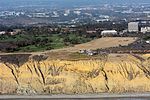Black's Beach

Black's Beach is a secluded section of beach beneath the bluffs of Torrey Pines on the Pacific Ocean in La Jolla, San Diego, California, United States. It is officially part of Torrey Pines State Beach. The northern portion of Black's Beach is owned and managed by the California Department of Parks and Recreation, while the southern portion of the beach, officially known as Torrey Pines City Beach, is jointly owned by the city of San Diego and the state park, but is managed by the city of San Diego. This distinction is important as Black's Beach is most known as a nude beach, a practice that is now prohibited in the southern portion managed by the city of San Diego.Black's Beach was named for the Black family who had a horse ranch overlooking the beach. They sold the land, and then it was subdivided into La Jolla Farms lots. The Farms' residents retained the Black family's private road to the beach. Many mansions can be seen in the southern portion of the beach, including the Salk Mansion. There is a funicular that goes all the way down from a mansion on the cliff to the beach into a structure known by locals as the mushroom house. A submarine canyon funnels swells into Black's Beach, making it appealing to surfers but dangerous for inexperienced swimmers. Usually, lifeguards are at the beach until 6:00 p.m., year round. Due to budget cuts, lifeguard patrols were limited but have increased because of funding by UC San Diego. Stingrays can be found along the coastline when the water gets above 50 degrees.
Excerpt from the Wikipedia article Black's Beach (License: CC BY-SA 3.0, Authors, Images).Black's Beach
Torrey Pines Scenic Drive, San Diego Torrey Pines
Geographical coordinates (GPS) Address Nearby Places Show on map
Geographical coordinates (GPS)
| Latitude | Longitude |
|---|---|
| N 32.88916 ° | E -117.25316 ° |
Address
Torrey Pines Gliderport
Torrey Pines Scenic Drive
92093 San Diego, Torrey Pines
California, United States
Open on Google Maps






